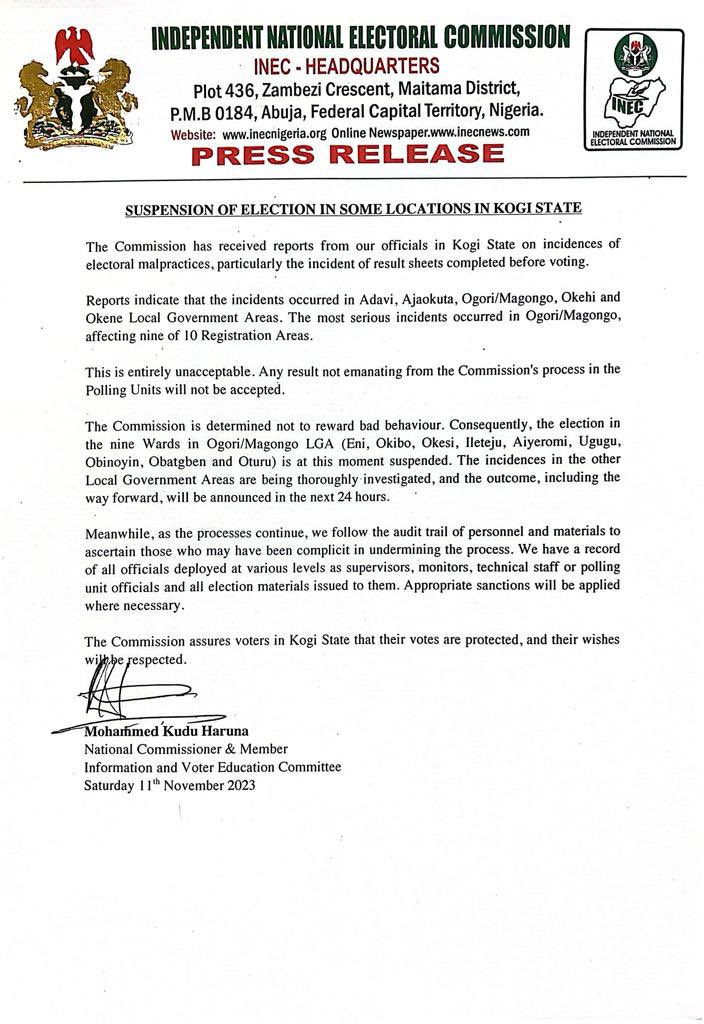The Independent National Electoral Commission (INEC) has swiftly responded to media reports alleging manipulation of voter accreditation data on the IReV (INEC Result Viewing) portal following the Kogi Governorship Election. According to the Commission, these allegations are unfounded and lack factual basis. Mohammed Kudu Haruna, National Commissioner and Member of the Information and Voter Education Committee, categorically denied any tampering with accreditation figures.
Clarifying the Accreditation Process
Haruna emphasized that the Bimodal Voter Accreditation System (BVAS) serves as the primary and most accurate source for voter accreditation data. BVAS, designed to function offline for faster and seamless authentication during elections, retains accreditation data automatically. The data is exported to the Accreditation Backend System (ABS) when the BVAS application is active and has a stable internet connection. The synchronization process, occurring post-poll, allows for continuous updates to accreditation figures as more data flows in, clarifying the basis for any changes reflected on the IReV portal.
Importance of Data Synchronization
The National Commissioner explained the synchronization process that takes place after the polls close. Presiding Officers are responsible for pressing the data exportation button on the BVAS, ensuring that all accreditation data is transferred to the ABS. This ongoing synchronization may lead to alterations in accreditation figures as new data is incorporated. However, it is crucial to note that changes cannot be made to the BVAS after the poll’s conclusion, providing transparency and accuracy in the accreditation process. Haruna urged the public to disregard misleading reports and misinformation, emphasizing the commitment of INEC to upholding the integrity of electoral processes.

INEC Explains BVAS Offline Functionality and Internet Connectivity
Haruna further clarified the functionality of BVAS, highlighting its offline capabilities for efficient voter authentication and accreditation. This offline mode, a key feature, expedites the electoral process by eliminating reliance on continuous internet connectivity. However, when the BVAS application is active and connected to the internet, it exports accreditation data to the ABS, ensuring the most up-to-date information is available on the IReV portal.
The National Commissioner drew a parallel between BVAS functionality and typical internet-related delays. Instances where the device application is inactive or internet connectivity is poor mirror scenarios where network services hinder the timely delivery of SMS messages. Haruna’s comparison aims to provide a relatable perspective on the challenges inherent in real-time data transmission, dispelling concerns about the credibility of the accreditation process.
Upholding Transparency through the IReV Portal
Haruna explained the purpose of the IReV portal as a means to provide the public with access to election results and accreditation figures. The portal’s caveat regarding accreditation figures serves as a precautionary measure, alerting users to the ongoing synchronization process that may lead to changes. By upholding transparency through platforms like IReV, INEC aims to foster trust and confidence in the electoral process, dispelling any doubts about the accuracy of accreditation data.
In summary, INEC vehemently denies allegations of manipulation on the IReV portal, assuring the public of the accuracy and transparency of the accreditation process through the BVAS. The Commission’s detailed explanation of the synchronization process and the offline functionality of BVAS aims to address concerns and ensure public confidence in the electoral system.
Table of Contents
Discover more from OGM News NG
Subscribe to get the latest posts sent to your email.














